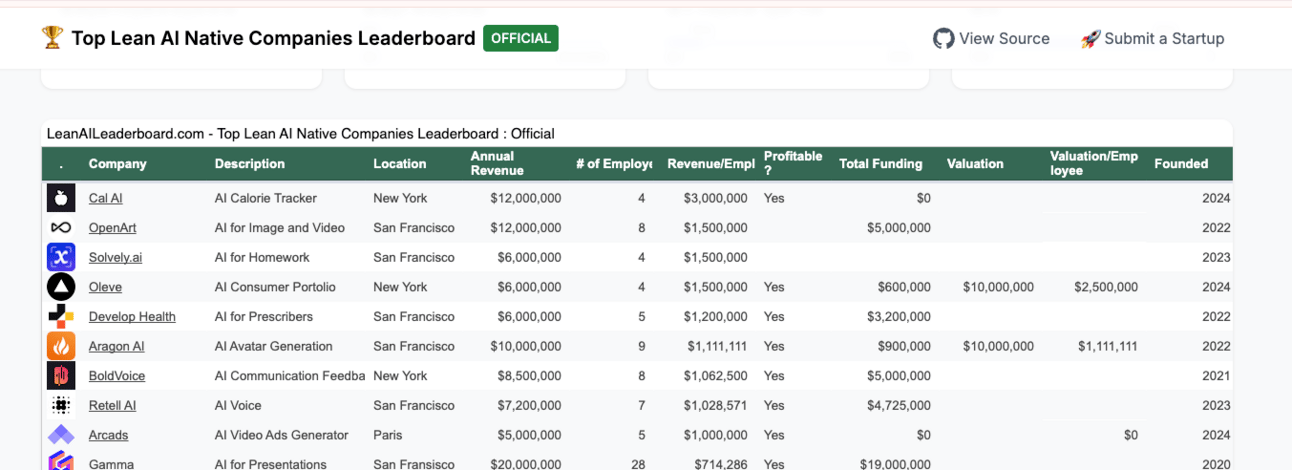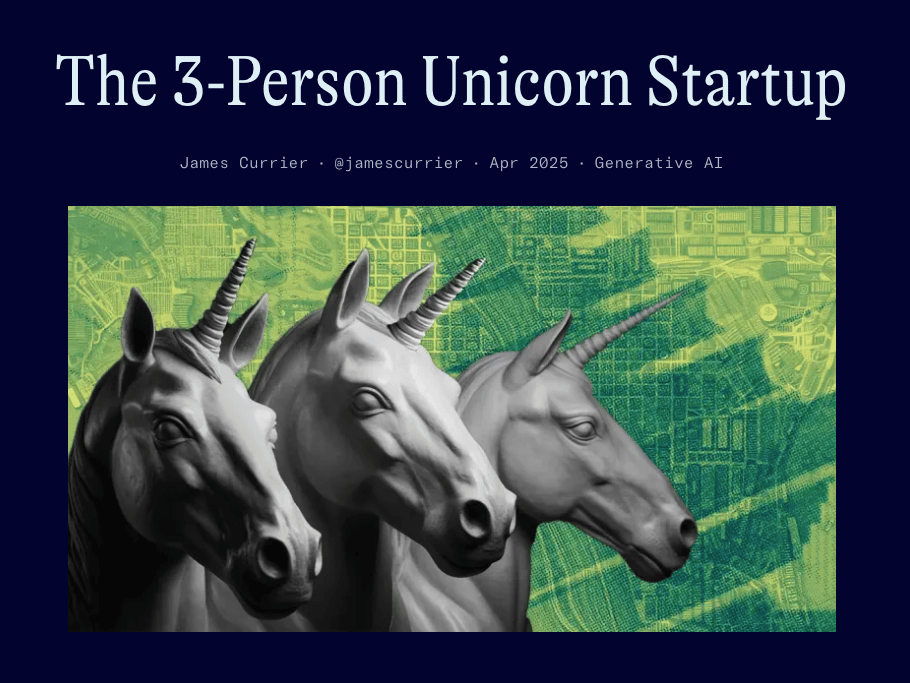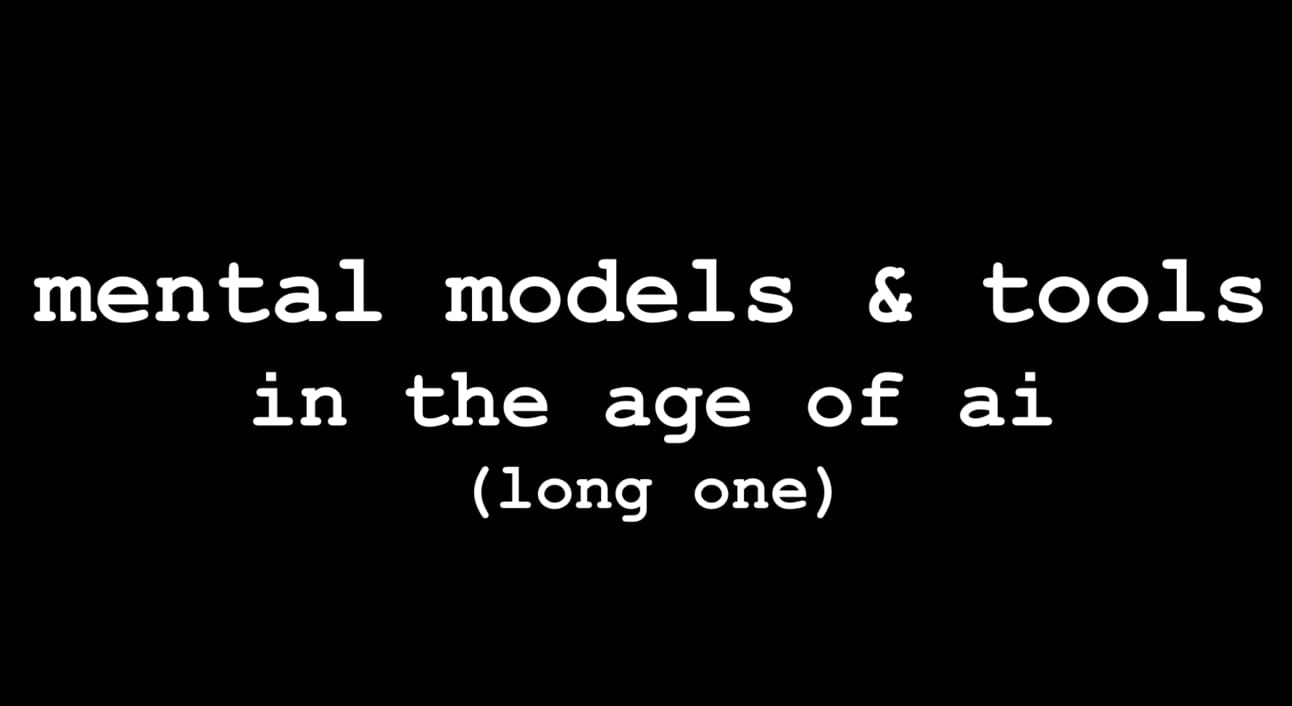in 2024 i wrote about the arrival and the rise of autonomous businesses (yes yes it’s cringe to cite oneself).
this was my suggested mental model 👇
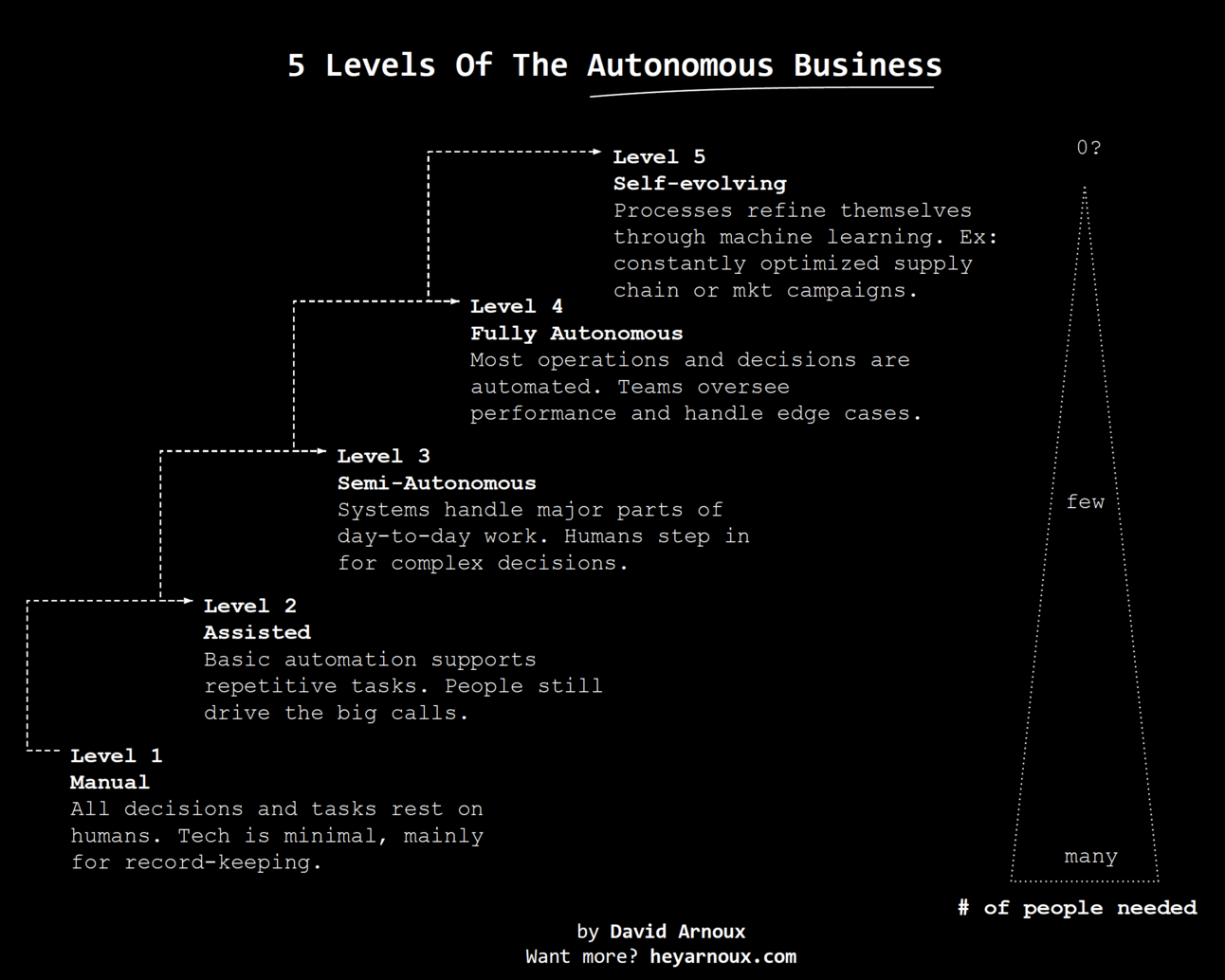
sure, we’re not at level 5 yet (or even 4), but we’re definitely getting closer, and fast.
in large part thanks to agents, multi-agent workflows, mcp and a2a protocols, it’s happening faster than we expected… or at least the arr/employee ratio is rapidly rapidly decreasing.
true, it’s mostly for saas, lightly regulated businesses at the moment.. but i’d argue this is simply the beachhead to much much wider-ranging change that will span across industries.
here’s a selection of a few recent examples (i purposely made a selection, check the full list here and only look at companies founded in 2024+)
here’s another illustration of what’s happening. more with less (people).

long story short, we’re doing more with much much less. and whether you like valuations and/or arr/revenue as a yard stick… it’s happening.
cursor. elevenlabs. mercor. not exactly 3-person companies, but they’re doing with 10-30 ppl what used to require 50-100. and it’s only the beginning.
you’re watching allometric scaling play out in real-time, where company size no longer limits growth speed, and headcount isn’t the lever it used to be.
what changed? founders stopped thinking in departments and started thinking in systems.
→ ai dev agents ship faster than full teams
→ ai sales agents qualify, pitch, and close deals while you sleep
→ ai marketing agents test 1000 hooks a day across every channel
→ ai support agents handle customers with perfect recall and zero wait time
→ ai ops agents handle finance, legal, compliance, hiring, even taxes
every function is now a plate you spin with ai. revisit, optimize, let it run.
small teams move faster. fewer people = fewer meetings, less politics, less burn, less dilution, more fun. and because ai runs at 100% most days, you don’t need people to be “on” every day.
this is the next wave of software businesses. it’s not as headcount-driven. it’s outcome-driven.
want more practical examples of the tools and processes that allow all these? i wrote these:
and here
the idea is…you don’t scale people. you scale outputs.
ok ok
so why even bother building a business in this context?
what moats are left for businesses you might ask?
where to start focusing and investing?
what moats are left in the age of ai?
here are my thoughts at the organisational/business-level:
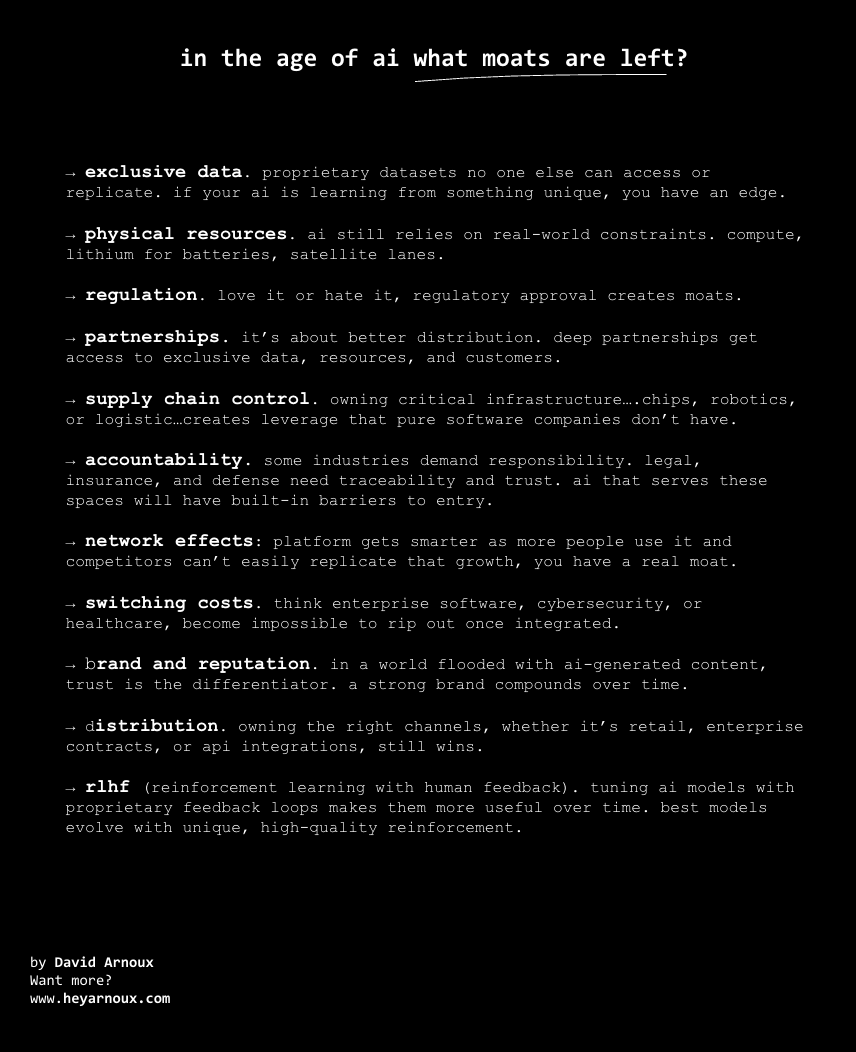
→ exclusive data. proprietary datasets that competitors can't access or replicate are gold. (note: this is where corporates can have such an advantage. if your ai learns from unique, hard-to-obtain data, you build a competitive advantage that’s tough to match. screw llms… the winners will be slms (small language models) that have 0,00001% hallucination rates on specific use cases. think micro-saas, that’s extremely precise, effective and just doesn’t get things wrong.
→ physical resources. atoms over bits. you get it, capital-intensive industries. with regards to the ai space…ai isn't purely digital. it still depends on tangible assets. compute power, lithium supplies for batteries, and satellite slots for communications are scarce and valuable. controlling these physical resources creates natural barriers to entry.
→ regulation. regulations, whether you love them or hate them, create friction. gaining regulatory approval can act as a moat because competitors must also navigate the same lengthy, costly processes to catch up.
→ partnerships. deep partnerships unlock better distribution channels, exclusive datasets, crucial resources, and customer bases that competitors can't easily replicate or penetrate. it’s about leveraging relationships and hard-to-build partnerships.
→ supply chain control. ownership or control over critical infrastructure like semiconductors, robotics manufacturing, or logistics provides leverage that purely digital competitors don’t have. physical control strengthens your market position.
→ accountability. some sectors require absolute accountability. think legal services, insurance, and defense industries. these fields demand trust, compliance, and traceability. ai platforms that meet these stringent standards create formidable entry barriers.
→ network effects. platforms that become smarter as they attract more users create a self-reinforcing cycle of improvement and adoption. this dynamic growth is challenging for competitors to replicate, forming a robust moat.
→ switching costs. once integrated, certain solutions particularly enterprise software, cybersecurity, or healthcare systems become deeply embedded and extremely costly to replace. high switching costs lock customers in, creating enduring advantages.
→ brand and reputation. trust becomes vital in a landscape saturated with ai-generated content. a strong brand and positive reputation compound value over time, becoming increasingly difficult for competitors to undermine. i think this is a major one. authenticity, brand and trust will be massive. any large marketing department today that measuring things correctly will tell you they get better roi from their brand efforts than their direct marketing efforts.
→ distribution. controlling key distribution channels, whether through retail presence, strategic enterprise contracts, or essential api integrations, still provides a decisive advantage in reaching and retaining customers.
→ rlhf (reinforcement learning with human feedback). ai models improve significantly when tuned with unique, proprietary human feedback loops. high-quality, exclusive reinforcement data makes models increasingly effective, creating a performance edge that competitors struggle to match.
what about the capital markets? vc’s? pe’s?
what happens to vc’s in all this? is there still a valid model when a team of 3,5,7 co-founders can grow so rapidly and automate everything? sure, i think there is and i think it looks like this:
a dev studio meets microfund. they back technical killers with contrarian theses.

they have agents that auto-test 100 ideas a month.
they fund what spikes.

they plug in growth infra from day one: content, ads, sales, all automated.
then they scale or sell.
this is venture + product studio + growth lab in one loop.
they don’t bet on decks. they bet on velocity.
they don’t need board seats. they need output.
they don’t care about “runway.” they care about momentum.
founders just build and become the ‘face’. capital handles everything else.
what about you? us? what skills to focus on to bullet-proof ourselves…
i have 3 thoughts on where we/you/i should focus.
we’re seeing the revenge of the super generalist
this book 100x

and watch or summarize this vid
i truly, strongly believe ‘good taste’ and cultural curiosity are going to make a massive comeback. when everyne has access to the same ai tools, the advantage goes to those you’d least expect…
those with cultural curiosity, artistic insight, good taste…
ai writes code, solves math problems, designs interfaces, edits videos, composes music etc faster than any human can.
but ai has no taste.
it doesn’t know why a bauhaus poster feels timeless. it doesn’t feel why pharrell’s production changed music. it doesn’t sense why a jean michel basquiat piece feels raw and urgent.
it just predicts. remixes. optimizes.
this is where humans still have the edge.
when the execution gap disappears, the real differentiator is what you choose to execute.
the eval
the taste to know:
→ which ideas feel fresh, not derivative.
→ which references add depth, not just nostalgia.
→ which trends will matter, not just go viral.
this is why the best founders, designers, and creators immerse themselves in art, music, literature, philosophy. they pull from unexpected places. they borrow from the past to make something new.
→ steve jobs studied calligraphy, which shaped the mac.
→ great memes borrow from 80s advertising without anyone realizing.
→ virgil abloh mixed brutalist architecture with streetwear
→ elon musk read sci-fi obsessively before building spacex.
→ nigo pulls from decades of fashion history to create the future
when everyone has access to the same ai tools, the advantage goes to those who can guide them with better instincts.
taste is what helps you:
→ prompt better.
→ curate better.
→ decide what should be built, not just what can be built.
this

what the wef has to say about this
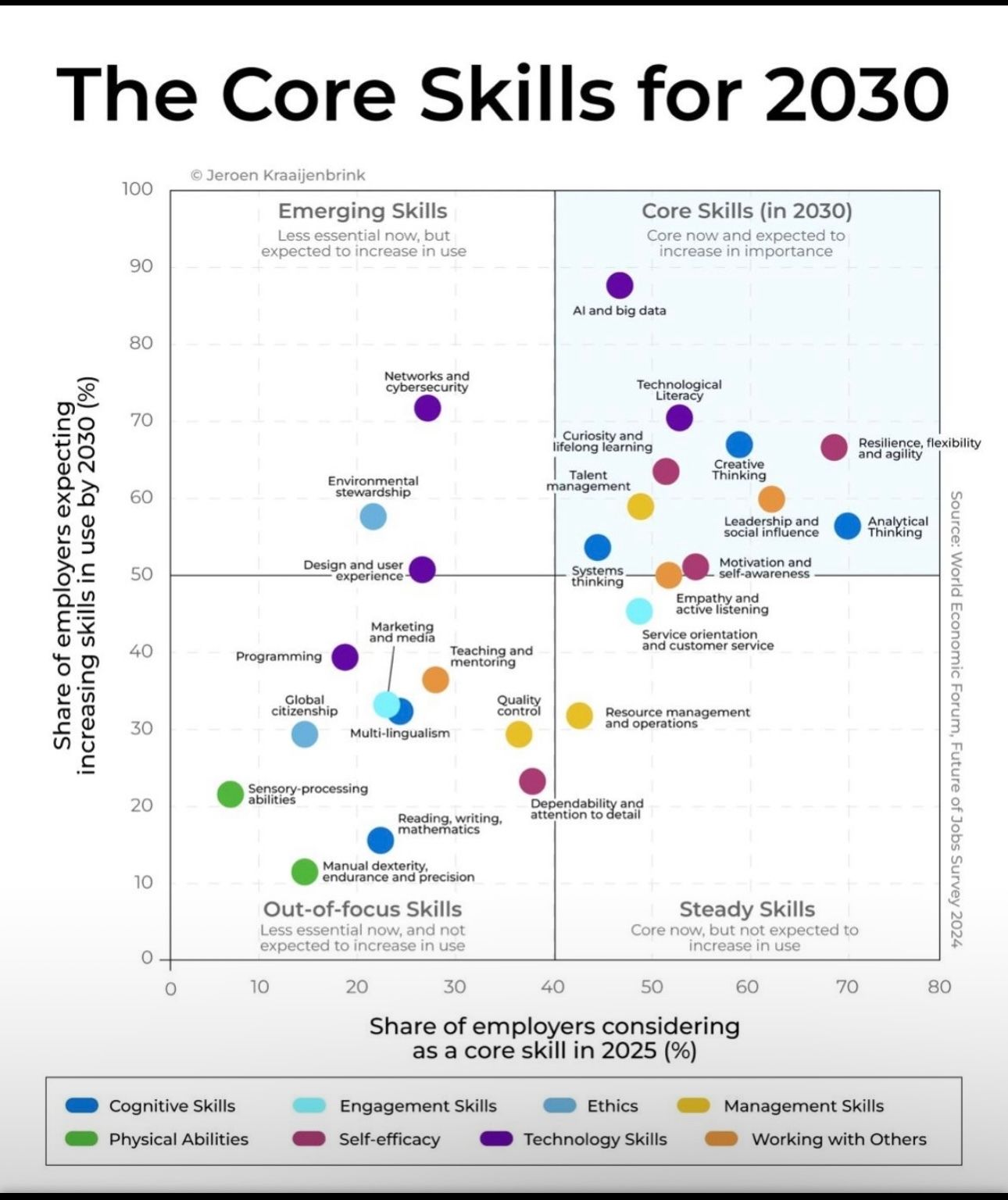
and yes, zoom in here

how i’m approaching this whole space apart from the things mentioned above?
with a mindset of extreme curiosity, openness to change and daily tinkering.
growth mindset times 100x.
mornings for deep work and/or clients. afternoons and evenings for relentless curious ‘tinkering’.
(trying to) stay sharp.
surrounding myself with people ‘on the edge’ and thinking about everything i shared above.
good luck out there.
⬛️
👋 by the way, we run a community called genai ⚫️ circle. it’s where i learn everything i share. it’s invite-only. as a subscriber of this newsletter you can apply to join. check it out here: www.thegenaicircle.com

